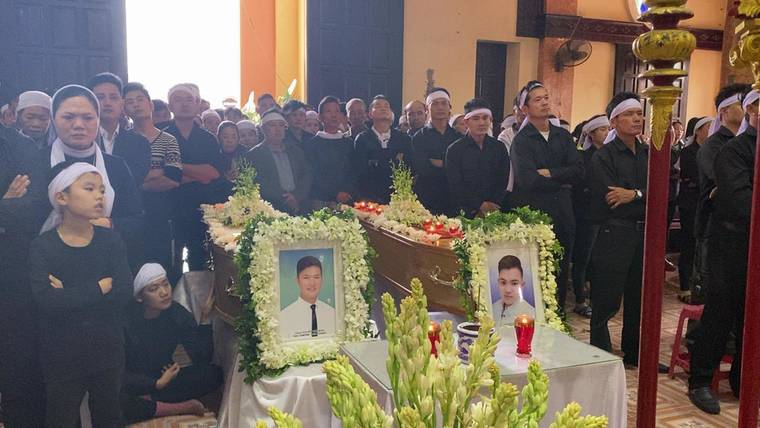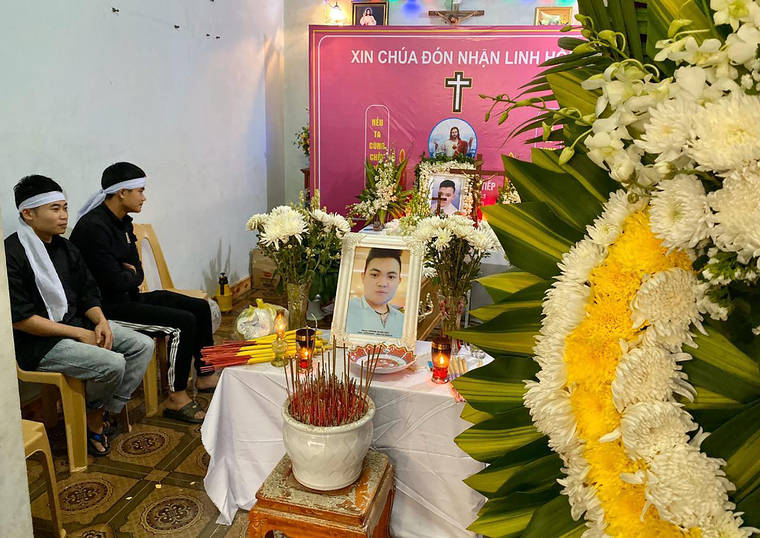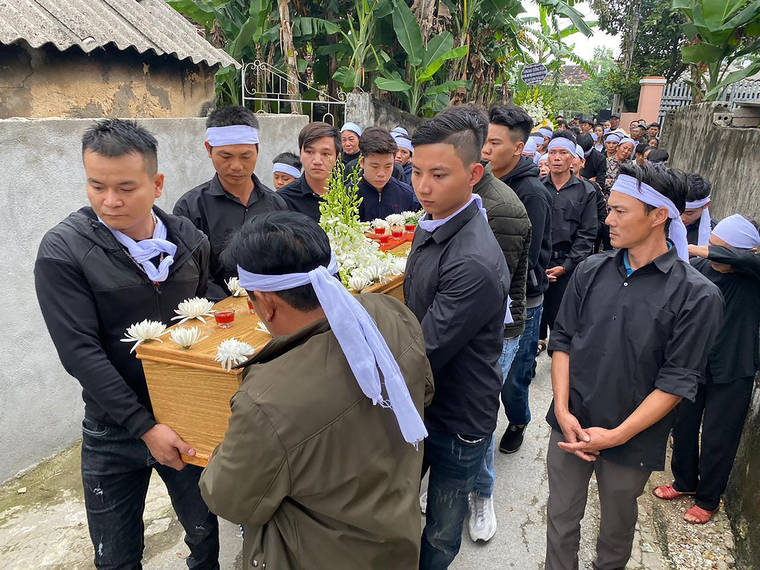DIEN THINH, Vietnam — The village of Dien Thinh bid farewell Thursday to two of its sons, victims of a human trafficking tragedy unveiled last month when the bodies of 39 Vietnamese were discovered in a truck in England.
Coffins with the bodies of cousins Nguyen Van Hung and Hoang Van Tiep were carried to the village’s Trung Song church for a funeral attended by about 300 people.
“Nguyen Van Hung and Hoang Van Tiep left their hometown to find a better future for themselves and for their families,” Rev. Pham Tri Phuong said. “But the tragedy happened that brought grave pain to the family and for all of us.”
The 31 men and eight women, aged between 15 and 44, are believed to have paid human traffickers to smuggle them to England. Their bodies were found east of London on Oct. 23, and while no cause of death has been officially established, the circumstances suggested asphyxiation.
The investigation is ongoing, and several people suspected of involvement with the case have been arrested in Britain and Vietnam.
The bodies of 16 of the victims, including Hung and Tiep, arrived in Vietnam on Wednesday and were sent on to their families. At least four funerals were held Thursday.
In Dien Thinh, a rural village of about 300 households on the coast of north-central Vietnam, they mourned not just the deaths, but also the circumstances.
“How can we not be in great pain when seeing their aging parents have to bid farewell to their young children,” Phuong told mourners. “How can we be not in great pain to see our brothers who had to suffer such a way of dying in a place so far from home.”
Dien Thinh, like many villages in Vietnam, have largely been left out of the economic development that has turned urban centers like Ho Chi Minh City and Hanoi into boom towns.
Many people in this largely Catholic village survive on small-scale farming of crops such as peanuts and sesame, supplemented by seasonal fishing. But there are others who have taken the chance and moved abroad in the hopes of better the lives of themselves and their families.
Earlier Thursday, the family of Tiep, 18 at the time of his death, hosted a wake attended by relatives and neighbors.
In the living room, two dozen sprays of white flowers lay by the sides of his coffin. A portrait of Tiep in France was propped on top.
He had posted the photo on his Facebook page in September with a caption reading: “Time will take what you have and will give it back to you if you try your best.”
On the wall behind his coffin, under a representation of The Last Supper, was a sign depicting Jesus with the words “God, please receive his soul.”
Mourners came to burn incense and pray.
“He will no longer have to be on his own in Europe,” said Tiep’s mother, Hoang Thi Ai. “He will now be resting by his family forever.”
The family of Tiep’s 33-year-old cousin and fellow victim, Nguyen Van Hung, lives just down the road and they too held a wake.
Hung had found jobs teaching music in several of Vietnam’s cities but his salary could not keep up with the higher cost of urban living, and he had no desire to return to his village.
“He was desperate to leave Vietnam, to earn more money,” his father Nguyen Thanh Le recalled earlier this month.
Hung managed to get to France in 2017, where he worked as a waiter at several restaurants. He still felt he needed to earn more, his father said, so undertook his deadly journey.
“It’s so sad,” said a friend of his from university, Cao Tri Thuc. “It’s painful when we lose those young people, my dear friends who were so young, full of energy with so many dreams.”
The two cousins were buried side by side in the local cemetary.
“The whole village and people from other neighborhoods came to bid farewell to them, holding white roses and that I hope, might comfort the families a bit,” said Rev. Nguyen Xuan Duong. “This loss is immense but the compassion I see here would help ease this terrible pain.”






